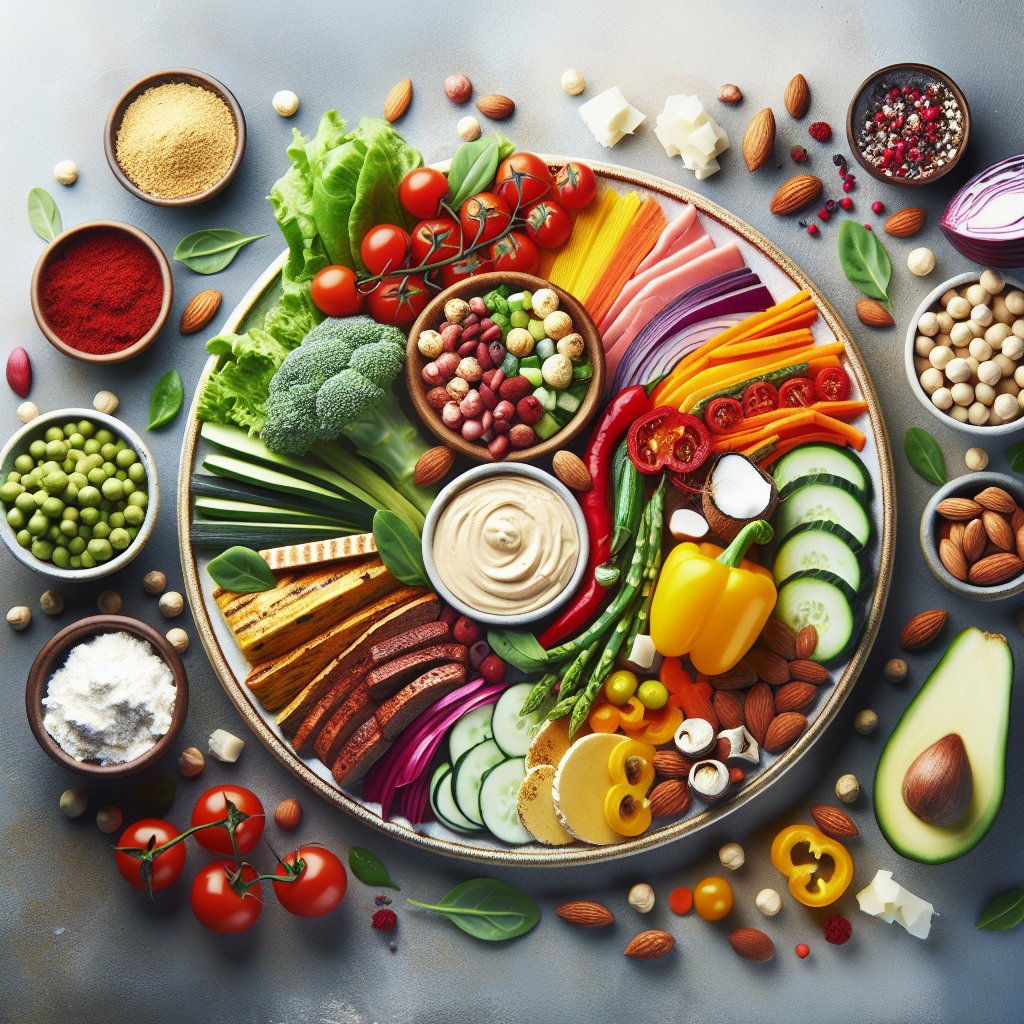Is Chickpea Flour Keto-Friendly? Unveiling the Truth About This Trendy Flour!
Is Chickpea Flour Keto-Friendly? Unveiling the Truth About This Trendy Flour!
Hey there, keto foodies! Today, we’re diving into the world of chickpea flour and its keto compatibility. If you’re anything like me, you love experimenting with different flours to create delicious low-carb recipes. But is chickpea flour a suitable choice for your keto lifestyle? Let’s find out!
What is Chickpea Flour?
Chickpea flour, also known as gram flour or besan, is a versatile, gluten-free flour made from ground dried chickpeas. It has been a staple ingredient in Indian, Middle Eastern, and Mediterranean cuisines for centuries, valued for its nutty flavor and high protein content.
Chickpea Flour Nutritional Profile
Before we delve into its keto-friendliness, let’s take a quick look at the nutritional profile of chickpea flour. A 100-gram serving of chickpea flour provides approximately:
- Protein: 22 grams
- Net Carbohydrates: 58 grams
- Fiber: 10 grams
- Fat: 6 grams
With its notable protein and fiber content, chickpea flour offers a substantial nutritional punch. However, the carb count raises the big question – can it align with a ketogenic diet?

Nutritional Profile of Chickpea Flour
Chickpea flour is a versatile ingredient that is not only delicious but also packed with essential nutrients. Let’s dive into the macronutrients and micronutrients found in this trendy flour to see if it’s keto-friendly.
Macronutrients
One cup of chickpea flour contains approximately 356 calories, 21 grams of protein, 6 grams of fat, and 53 grams of carbohydrates, of which 10 grams are dietary fiber. The high protein and fiber content can aid in satiety and weight management, while the moderate amount of fat makes it a balanced option for a keto diet.
Micronutrients
Chickpea flour is also rich in micronutrients such as folate, iron, magnesium, and phosphorus. Folate is crucial for cell division and DNA synthesis, while iron is essential for oxygen transport in the blood. Magnesium plays a role in various biochemical reactions in the body, and phosphorus is important for bone health and energy metabolism.
With its impressive nutrient profile, chickpea flour can certainly be incorporated into a keto diet in moderate amounts, especially when combined with other low-carb ingredients.
Keto Diet Overview
So, you may have heard about the keto diet by now. It’s been creating quite a buzz lately, and for good reason! The ketogenic diet, or keto diet for short, is all about transforming your body into a fat-burning machine. Wondering how it works? Let me break it down for you.
The keto diet is a low-carb, high-fat eating plan that offers numerous health benefits. When you significantly reduce your carb intake and replace it with fat, your body enters a metabolic state called ketosis. In this state, your body becomes incredibly efficient at burning fat for energy. This means you can shed those unwanted pounds while still feeling satisfied and energized. Sounds pretty fantastic, right?
The principles of the keto diet are based on the science behind ketosis. By drastically cutting your carb intake and increasing your consumption of healthy fats, you can experience improved weight loss, enhanced mental focus, stabilized blood sugar levels, and even reduced risk of heart diseases, among other benefits.
So, if you’re curious about whether chickpea flour is keto friendly, stay with me as we dig deeper into this intriguing topic.
Keto-Friendly Criteria
When evaluating whether a food is keto-friendly, there are several criteria to consider:
Low Carbohydrate Content
For a food to be considered keto-friendly, it should have a low carbohydrate content. This is because the ketogenic diet relies on drastically reducing carb intake to induce a state of ketosis, where the body burns fat for fuel instead of carbohydrates.
High Fat Content
Another important criterion is the fat content. Keto-friendly foods typically have a higher fat content, as fats become the primary source of energy on a ketogenic diet.
Moderate Protein Content
While protein is essential for the body, excessive protein intake can hinder ketosis. Therefore, keto-friendly foods should have a moderate protein content.
Minimal or No Added Sugars
Added sugars can quickly spike blood sugar levels, leading to a disruption in ketosis. Keto-friendly foods should ideally have minimal or no added sugars.
Considering these criteria, it’s vital to assess whether chickpea flour aligns with the requirements to be classified as keto-friendly.

Is Chickpea Flour Keto-Friendly?
One of the most common questions in the ketogenic community is whether chickpea flour is keto-friendly. Let’s evaluate whether chickpea flour meets the keto-friendly criteria.
Chickpea Flour’s Compatibility with Keto Diet
Chickpea flour, also known as gram flour or besan, has gained popularity for its versatility and nutty flavor. It’s a staple in many cuisines and is commonly used in gluten-free and vegan cooking. But how does it fare in the keto world?
Chickpea flour contains approximately 58 grams of carbs and 10 grams of fiber per 100 grams, resulting in a net carb content of 48 grams. While this net carb count is higher than what is typically recommended on a keto diet, it can still fit into a keto meal plan if used in moderation.
As with any ingredient on a keto diet, portion control is key. Since chickpea flour is higher in carbs, it’s essential to use it judiciously to stay within your daily carb limit. You can enjoy small servings of keto-friendly recipes that include chickpea flour, such as low-carb flatbreads or savory pancakes, while still maintaining ketosis.
Additionally, chickpea flour is rich in protein and provides essential nutrients like iron, magnesium, and B vitamins. This nutritional profile makes it a wholesome option for those following a balanced and varied ketogenic diet.
So, is chickpea flour keto-friendly? While it may not be a traditional keto ingredient due to its carb content, it can still be incorporated into the keto diet with mindful planning and moderation.
Benefits of Chickpea Flour
Chickpea flour, also known as gram flour or besan, has been gaining popularity in the health and wellness community, and for good reason! This gluten-free flour is not only versatile in the kitchen, but it also offers a myriad of potential health benefits.
One of the most significant advantages of chickpea flour is its impressive nutritional profile. A 100-gram serving of chickpea flour contains approximately 10 grams of protein, 5 grams of fiber, and only 58 grams of net carbs, making it a valuable option for those following a ketogenic diet.
Furthermore, chickpea flour is rich in essential nutrients such as folate, iron, magnesium, and B vitamins, all of which are vital for overall health and well-being.
Research indicates that consuming chickpea flour may contribute to improved blood sugar levels, reduced inflammation, and enhanced digestive health. It also contains a good amount of antioxidants, which play a crucial role in protecting the body against various diseases.
So, not only is chickpea flour keto-friendly due to its low net carb content, but it also brings a host of potential health benefits to the table, making it a fantastic inclusion in a ketogenic diet.
Drawbacks of Chickpea Flour on Keto Diet
While chickpea flour is a versatile and popular alternative to traditional flours for those following a keto diet, it does have some drawbacks that are important to consider.
First and foremost, chickpea flour is relatively higher in carbohydrates compared to other keto-friendly flours, such as almond flour or coconut flour. This higher carb content can make it challenging to stay within the desired macronutrient ratios for ketosis, especially for individuals who are sensitive to carbohydrates.
Additionally, chickpea flour contains anti-nutrients such as phytic acid and lectins, which may interfere with nutrient absorption and digestion in some individuals. This could potentially lead to digestive discomfort or nutrient deficiencies over time.
Furthermore, while chickpea flour is a good source of plant-based protein and fiber, it is important to consume it in moderation on a keto diet. Excessive consumption of chickpea flour could hinder ketosis due to its impact on blood sugar levels and insulin response.
It’s also worth noting that some individuals may be sensitive or allergic to legumes, which could lead to adverse reactions when consuming chickpea flour.
When incorporating chickpea flour into a keto diet, it’s essential to be mindful of portion sizes and be aware of how it may impact your individual ketosis and overall well-being.
While chickpea flour can be enjoyed in moderation as part of a well-rounded keto diet, it’s important to acknowledge the potential drawbacks and make informed choices based on individual health goals and sensitivities.

Alternative Flours for a Keto-Friendly Diet
When it comes to following a ketogenic diet, finding suitable flour alternatives that align with the low-carb, high-fat requirements can be a game-changer. While chickpea flour has gained popularity, especially in gluten-free and vegan baking, it may not be the best choice for those following a keto lifestyle due to its relatively higher carb content.
Luckily, there are numerous keto-friendly flour alternatives available that not only keep your carb intake in check but also offer unique flavors and textures. Almond flour, coconut flour, and flaxseed flour are some of the top contenders in the world of ketogenic baking. These flours are not only low in carbs but also boast high levels of healthy fats and fiber, making them an ideal choice for keto enthusiasts.
Almond Flour
Almond flour, made from finely ground almonds, is a popular choice for keto baking due to its mild, nutty flavor and versatility. It’s low in carbs and high in monounsaturated fats, which can support heart health. Additionally, almond flour is rich in vitamin E, a powerful antioxidant that helps protect cells from damage.
Coconut Flour
Coconut flour, derived from dried and ground coconut meat, is another great option for keto-friendly baking. With its high fiber content and low glycemic index, coconut flour can help stabilize blood sugar levels and support digestive health. It has a subtly sweet taste and can absorb a significant amount of liquid, so be sure to adjust the liquid-to-flour ratio in recipes accordingly.
Flaxseed Flour
Flaxseed flour, made from ground flaxseeds, is a nutritional powerhouse. It’s packed with omega-3 fatty acids, lignans, and fiber, all of which contribute to improved heart health, digestion, and overall well-being. Flaxseed flour has a slightly nutty flavor and pairs well with both sweet and savory recipes, making it a versatile ingredient in keto cooking.
By incorporating these keto-friendly flour alternatives into your culinary repertoire, you can continue to enjoy your favorite baked goods and savory dishes while staying true to your ketogenic goals.
Tips for Using Chickpea Flour on Keto Diet
Now that we’ve established that chickpea flour can indeed be incorporated into a keto diet, let’s talk about some practical tips to make the most of this versatile ingredient while staying within your carb limits.
Measure Portion Sizes Carefully
Chickpea flour, although lower in carbs compared to traditional wheat flour, still needs to be used in moderation on a keto diet. Be mindful of your portion sizes to ensure you stay within your daily carb allowance.
Experiment with Recipes
Try substituting a portion of almond or coconut flour with chickpea flour in your keto-friendly baking recipes. It can bring a nutty flavor and a denser texture to your baked goods, providing a delightful change in taste and consistency.
Whip Up Savory Dishes
Chickpea flour is fantastic for creating savory dishes such as flatbreads, pancakes, and even pizza crust. These dishes can add variety to your keto meals and infuse them with a unique taste.
Combine with High-Fiber Ingredients
Since chickpea flour is relatively high in fiber, it can aid in digestion and contribute to a feeling of fullness. Consider combining it with other high-fiber, low-carb ingredients like flaxseeds, chia seeds, or psyllium husk for an extra boost of nutrition.
Being creative with chickpea flour and incorporating it into your keto lifestyle can offer a delightful change of pace and bring a range of flavorful options to your table.
Conclusion: Is Chickpea Flour Keto-Friendly?
So, is chickpea flour keto-friendly? Let’s summarize the key points we have discussed and provide a final recommendation based on scientific research and the principles of the ketogenic diet.
Key Points:
-
Carbohydrate Content: Chickpea flour is relatively high in carbohydrates, with approximately 20 grams of carbs per 1/4 cup serving.
-
Fiber Content: It’s worth noting that chickpea flour also contains a good amount of fiber, with around 5 grams per 1/4 cup serving. Fiber helps slow down the digestion of carbs, which can minimize blood sugar spikes and aid in better blood sugar control.
-
Protein Content: Chickpea flour is also a decent source of plant-based protein, providing nearly 6 grams per 1/4 cup serving.
-
Glycemic Index: Research indicates that chickpea flour has a lower glycemic index compared to regular wheat flour, which means it has a slower impact on blood sugar levels.
Final Recommendation:
After evaluating the information, it’s evident that while chickpea flour is not as low in carbs as some other keto-friendly flours, its fiber content and lower glycemic index make it a better option compared to traditional wheat flour.
In conclusion, incorporating chickpea flour in moderation can be compatible with a ketogenic lifestyle, especially when factoring in its fiber and protein content. However, it’s essential to be mindful of portion sizes to stay within your daily carb limits.
Ultimately, your personal tolerance for chickpea flour within the context of your overall macronutrient intake and ketogenic goals should guide your decision. If you choose to include chickpea flour in your keto diet, remember to prioritize balance and mindful consumption.
In the end, the key to a successful keto diet is finding what works best for you and what makes you feel your best!


